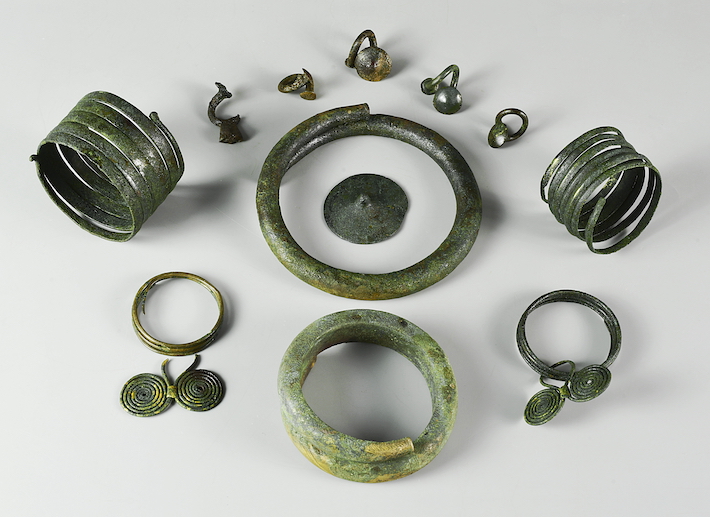 PAPOWO BISKUPIE, POLAND—Newsweek reports that some 550 bronze artifacts and human bones thought to represent more than 30 people have been recovered from a dried-out lake bed in north-central Poland by a team of researchers led by Jacek Gackowski of Nicolaus Copernicus University. Radiocarbon dating of the site suggests that the human remains were placed in the lake before the metal deposits were made by members of the Chełmno group of the Lusatian culture, which inhabited the region between 1200 and 450 B.C. It had been previously thought that this group did not place much ritual significance on metal objects, unlike Lusatian peoples to the south. The discovery indicates, however, that the Chełmno group's belief system eventually aligned with the rest of Lusatian culture. These metal objects are thought to have been jewelry worn on the arms and around the neck. Read the original scholarly article about this research in Antiquity. To read about artifacts deposited as grave goods at a Lusatian cemetery, go to "World Roundup: Poland."
PAPOWO BISKUPIE, POLAND—Newsweek reports that some 550 bronze artifacts and human bones thought to represent more than 30 people have been recovered from a dried-out lake bed in north-central Poland by a team of researchers led by Jacek Gackowski of Nicolaus Copernicus University. Radiocarbon dating of the site suggests that the human remains were placed in the lake before the metal deposits were made by members of the Chełmno group of the Lusatian culture, which inhabited the region between 1200 and 450 B.C. It had been previously thought that this group did not place much ritual significance on metal objects, unlike Lusatian peoples to the south. The discovery indicates, however, that the Chełmno group's belief system eventually aligned with the rest of Lusatian culture. These metal objects are thought to have been jewelry worn on the arms and around the neck. Read the original scholarly article about this research in Antiquity. To read about artifacts deposited as grave goods at a Lusatian cemetery, go to "World Roundup: Poland."
Artifacts in Poland Upend Understanding of Bronze Age Culture
